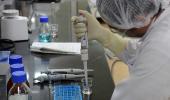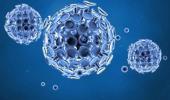Scientists have identified and tested an antibody that limits the severity of infections from a variety of coronaviruses, including those that cause COVID-19 as well as the SARS illness.

The study, published in the journal Science Translational Medicine on Tuesday, isolated the antibody by analysing blood from a patient who had been infected with the SARS-CoV-1 virus, which caused the SARS outbreak, and from a current COVID-19 patient.
"This antibody has the potential to be a therapeutic for the current epidemic," said study co-senior author Barton Haynes, director of Duke University Human Vaccine Institute, US.
"It could also be available for future outbreaks, if or when other coronaviruses jump from their natural animal hosts to humans," Haynes said.
The researchers identified over 1,700 antibodies, which the immune system produces to bind at specific sites on specific viruses to block the pathogen from infecting cells.
When viruses mutate, many binding cites are altered or eliminated, leaving antibodies ineffectual, they said.
However, the researchers noted that there are often sites on the virus that remain unchanged despite mutations.
They focused on antibodies that target these sites because of their potential to be highly effective across different lineages of a virus.
Of the 1,700 antibodies from the two individuals, the researchers found 50 antibodies that had the ability to bind to both the SARS-CoV-1 virus as well as SARS-CoV-2, which causes COVID-19.
Further analysis found that one of those cross-binding antibodies was able to bind to a multitude of animal coronaviruses in addition to the two human-infecting pathogens.
"This antibody binds to the coronavirus at a location that is conserved across numerous mutations and variations," Haynes said.
"As a result, it can neutralise a wide range of coronaviruses," he explained.
Researchers at the University of North Carolina at Chapel Hill (UNC), US, tested the antibody in mice to determine whether it could effectively block or minimise the infections.
They found that when given before the animals were infected, the antibody protected mice against developing SARS, COVID-19 and its variants such as delta.
The researchers also found that the antibody provide protection from many animal coronaviruses that have the potential to cause human pandemics.
"The findings provide a template for the rational design of universal vaccine strategies that are variant-proof and provide broad protection from known and emerging coronaviruses," said study co-senior author Ralph S Baric, a professor at UNC Gillings School of Global Public Health.
When given after infections, the antibody reduced severe lung symptoms compared to animals that were not treated with the antibody, according to the researchers.
"The therapeutic activity even after mice were infected suggests that this could be a treatment deployed in the current pandemic, but also stockpiled to prevent the spread of a future epidemic with a SARS-related virus," said David Martinez, a post-doctoral researcher at UNC's Gillings School.
"This antibody could be harnessed to prevent maybe SARS-CoV-3 or SARS-CoV-4," Martinez added.











 © 2025
© 2025